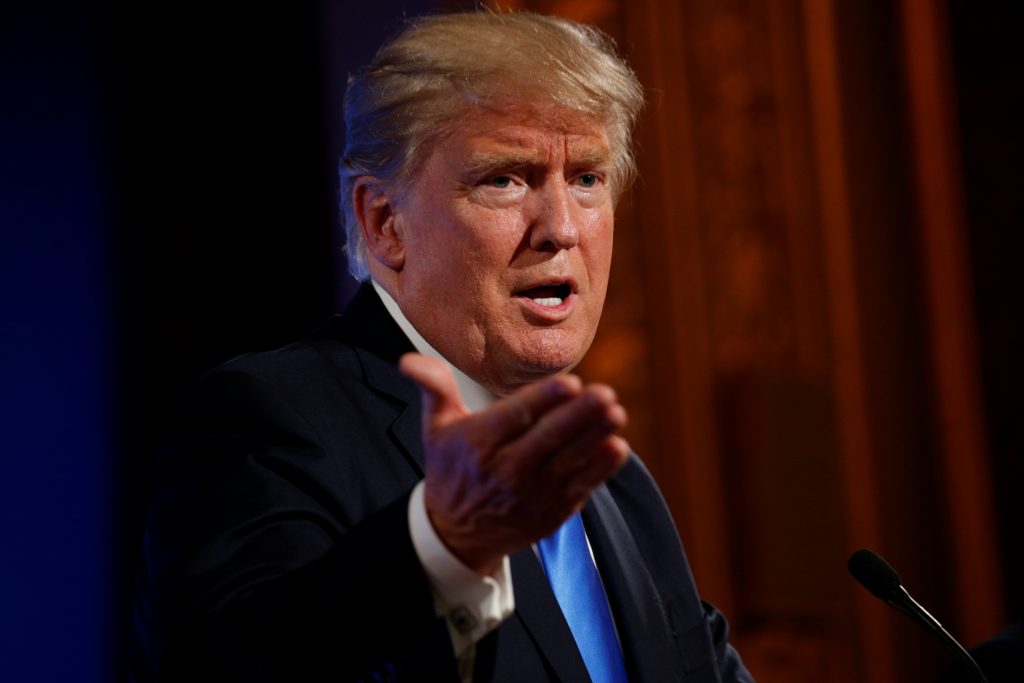
Editor’s note: This story was originally published in 2017, and updated Monday.
President Donald Trump’s tweet Monday claiming that he has “the absolute right to PARDON myself” reignited the legal debate about presidential pardons. Trump suggested that “numerous legal scholars” share his opinion.
But there is plenty of disagreement on the subject of whether Trump could pardon himself in connection to special counsel Robert Mueller’s Russia investigation.
Here is a look at the legal debate surrounding presidential pardons.
The president’s pardon power is derived from the Constitution’s Article 2, Section 2, Clause 1: “The President shall be Commander in Chief … he shall have Power to grant Reprieves and Pardons for Offenses against the United States, except in Cases of Impeachment.”
The pardon power is broad and near-absolute. And, for textual purists — nowhere in the body of the Constitution does it say the president cannot pardon himself.It’s an impressive and unique power: the president can pardon virtually anybody, and he answers neither to Congress nor the courts before issuing these notes. The president can even pardon individuals for crimes for which they haven’t yet been charged. Consider President Ford’s 1974 pardon of President Nixon, which covered “all” offenses the disgraced president might have committed in office. President Carter, too, in 1977 granted a blanket-pardon for Vietnam War draft-evaders.
There are limits: the president can only pardon federal crimes, while governors are in charge of the states. And most notably, as the Constitution explicitly states: a pardon does not extend to cases of congressional impeachment. Simply put, the president cannot immunize himself from political removal.
So, can the president pardon his son, Donald Trump, Jr.? How about aides and devotees like son-in-law Jared Kushner, former campaign manager Paul Manafort, or former National Security Adviser Michael Flynn?
READ MORE: White House Press Secretary Sean Spicer resigns
“There’s no question of the president’s power to pardon those other individuals for past crimes,” says Walter Dellinger, who worked for the Department of Justice’s Office of Legal Counsel from 1993 to 1996. But, he added, “Whether a pardon could be treated as part of a conspiracy to obstruct justice is an interesting and difficult question.”
A president’s pardon might be considered improper, for example, if it ran afoul of a different part of the Constitution, or, as Dellinger suggests, if the pardon was itself a conspiracy or bribery. In such a case, the pardon would likely be considered legally-binding, though the act itself would be criminal.
As for the question on most people’s minds: Can the president pardon himself, for a crime he committed? “The simple fact is, we just don’t know,” says Brian Kalt, a professor at the Michigan State University College of Law, and author of Constitutional Cliffhangers: A Legal Guide for Presidents and Their Enemies. “It’s never been tested, no court has ever weighed in on it, and there are no cases we can analogize from.”
Again, the pardon power is broad and near-absolute. And, for textual purists — nowhere in the body of the Constitution does it say the president cannot pardon himself.
But a pardon is, in theory, an act done unto another — and a self-pardon, Kalt suggests, seems contradictory. ” “Inherent in the notion of a pardon is that it’s bilateral,” he says.
The notion of a president preemptively pardoning himself would also clearly invite questions over a seemingly axiomatic truth in law: one cannot rule on his or her own case. This Watergate-era Justice Department opinion (1974) seems to suggest as much: Presidents cannot pardon themselves, “under the fundamental rule that no one may be a judge in his own case.”
It does, however, imagine a more subversive and potentially constitutional roadmap for a president: what if a president temporarily steps down from office, under the 25th Amendment, and the vice president becomes the acting president? Can he then pardon the president, who, now pardoned, returns to office? That seems unlikely.
A presidential self-pardon, or a pardon of his closest aides, at this point seems to be a mere thought experiment. But Marty Lederman, who worked for the Department of Justice’s Office of Legal Counsel from 1994 to 2002 and 2009 to 2011, and now teaches at the Georgetown University Law Center , says “Regardless of who he pardons, I assume Mueller will continue to do his investigation and then, at a minimum, write a report describing in detail the engagements with Russia.”
After that, it’s in Congress’ hands, Lederman says. “After which it’s in Congress’s hands, even in cases where a pardon precludes any prosecution.”
ncG1vNJzZmivp6x7sa7SZ6arn1%2Bjsri%2Fx6isq2egpLmqwMicqmibkaN6sb7ErKCdnZ6perW%2B1KanZqiRp7Gwug%3D%3D